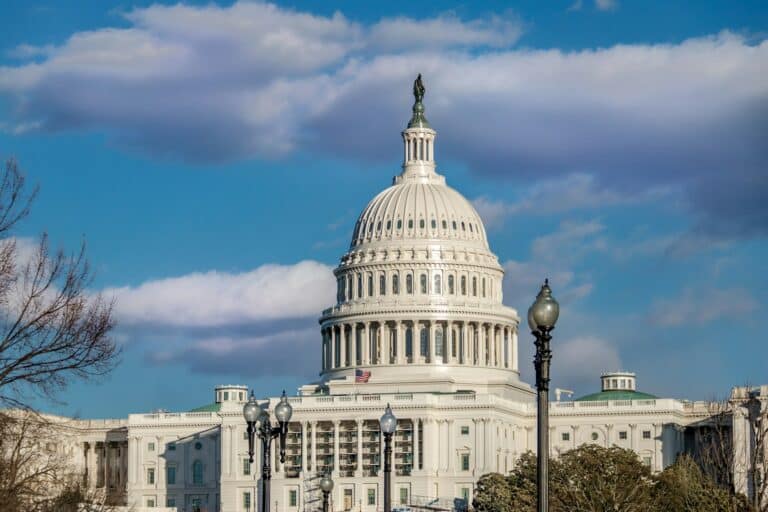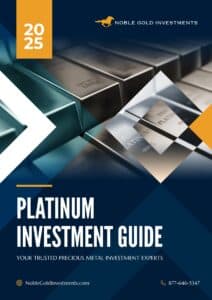The Monetary Metals Tax Neutrality Act (H.R. 8279) is a pivotal piece of legislation aimed at redefining the way precious metals transactions are treated under federal income taxation. Introduced in the 118th Congress, this bill seeks to eliminate capital gains taxes on precious metals like gold and silver, promoting their use and investment.
The bill has gained substantial support from various advocates, including the Sound Money Defense League and Money Metals Exchange, highlighting the growing movement towards sound monetary policies. If passed, it would mark a significant shift in how investors approach precious metals, offering potential tax relief and incentivizing the ownership of these assets. Keep reading to learn more about this bill and what it means for precious metals markets.
Overview of the Monetary Metals Tax Neutrality Act
The Monetary Metals Tax Neutrality Act (H.R. 8279) seeks to eliminate federal income tax obligations on gains and losses from sales or exchanges of precious metals like gold and silver.
Beyond the investment community, the Monetary Metals Tax Neutrality Act could have broader economic implications by encouraging the use of gold and silver as stable financial instruments. This legislation underscores a commitment to monetary stability and could reshape federal income taxation dynamics in the precious metals market.
Purpose and Significance
The Monetary Metals Tax Neutrality Act clarifies that gains or losses from the sale or exchange of certain coins or bullion should not be included in federal income calculations. Sponsored by Rep. Alex Mooney, the bill is supported by groups such as the Sound Money Defense League and the Money Metals Exchange.
This measure promotes sound money legislation, which advocates for the use of monetary metals as an investment tool and store of value. By exempting these transactions from federal taxes, investors are encouraged to include precious metals in their portfolios without worrying about tax implications.
Key provisions of H.R. 8279 include:
- Exemption from Tax: Gains or losses from the sale or exchange of specific coins or bullion are exempt from federal income taxes.
- Types of Metals: The bill covers gold, silver, and potentially other monetary metals used in transactions.
- Affected Transactions: Both sales and exchanges are considered, reflecting the act’s broad scope.
This legislation amends the Internal Revenue Code of 1986 to bring these changes into effect. Important for investors, these provisions can make precious metals more attractive as financial assets.
Impact on Gold and Silver Transactions
The impact on gold and silver transactions is significant. By removing tax obligations, the act seeks to level the playing field for precious metals compared to other types of investments. This can lead to increased transactions and investment in coins and bullion.
Supporters argue that this policy will help maintain the value of investment portfolios and offer a hedge against inflation. It also aligns with monetary economics’ broader goals by encouraging the utilization of sound money principles, enhancing financial stability, and reducing reliance on fiat currencies.
Tax Implications and Exemptions
Under current federal laws, gold and silver are treated as collectibles. When sold or exchanged, any gain on these assets is subject to the capital gains tax.
Since they are classified as collectibles, the long-term capital gains tax rate can be as high as 28%, which is higher than the standard rate for other capital assets.
This includes both short-term and long-term gains, with short-term gains being taxed based on the seller’s ordinary federal taxable income.
Proposed Changes to Tax Regulations
The Monetary Metals Tax Neutrality Act proposes to amend the Internal Revenue Code of 1986. This would remove the recognition of gain or loss on the sale or exchange of certain precious metals like gold and silver coins and bullion.
This means that individuals would no longer need to calculate and report capital gains for these transactions. Essentially, this eliminates the federal income tax implications for trading these assets.
This reclassification can lead to simplification in tax filings and potentially decrease federal taxable income derived from precious metals trades.
Examples of Tax Calculations
Consider an individual selling gold coins. Under current laws, if they bought the coins for $1,000 and sold them for $1,500, they must recognize a gain of $500. If these coins were held for over a year, this gain could be taxed at the long-term capital gains rate of up to 28%.
With the proposed act, the same $500 gain would no longer need to be included in federal income calculations. This means no capital gains tax would apply, simplifying taxation and reporting requirements.
State income taxation may still apply, depending on local laws, requiring individuals to consider these implications separately.
Legislative Journey of H.R. 8279
The bill, introduced in the 118th Congress, was sponsored by Representative Alex Mooney from West Virginia. Mooney, known for his advocacy for sound money principles, aimed to eliminate federal income taxation on gold and silver coins and bullion. Representative Mooney was joined by co-sponsors, including Reps. Scott Perry and Randy Weber. Their goal was to address inconsistencies in the taxation of monetary metals, promoting a more fair and transparent tax system for investors.
Committee Considerations
Upon introduction, H.R. 8279 was referred to the House Committee on Ways and Means, the body responsible for overseeing matters related to taxation and revenue. The committee evaluated the bill’s potential impact on the Internal Revenue Code and considered testimonies from various stakeholders, including the Sound Money Defense League and other free-market advocates.
The committee’s deliberations were crucial in shaping the final language of the bill, ensuring it aligned with broader tax policy objectives while addressing specific concerns related to monetary metals.
Advancements in the House and Senate
After a thorough review, the bill progressed to the House floor, where it underwent debate and amendments. It garnered support from a mix of legislators who emphasized the economic benefits of tax neutrality for precious metals. Once passed by the House, H.R. 8279 moved to the Senate. In the Senate, it was scrutinized by the relevant committees and eventually brought to a vote.
The bill’s successful passage through both chambers highlighted the bipartisan support for reducing tax burdens on investments in gold and silver, setting the stage for the president to sign it into law.
Support and Opposition
Sound money activists, including the Sound Money Defense League, strongly support H.R. 8279. They argue that removing federal income taxation from gold and silver coins aligns with the U.S. Constitution, which explicitly recognizes these metals as legal tender.
Free-market activists emphasize that the current tax treatment of precious metals distorts free-market principles by penalizing holders of gold and silver during inflationary periods. Advocates also highlight that removing tax burdens can protect against currency debasement initiated by the Federal Reserve’s monetary policies.
Additionally, supporters believe this legislation would encourage more Americans to invest in physical assets, such as coins minted by the U.S. Mint, providing a hedge against economic instability.
Critiques from Opponents
Critics of the Monetary Metals Tax Neutrality Act express concerns regarding its implications on federal tax revenues. They warn that exempting gold and silver from income tax might reduce the taxes collected, impacting funding for public services and fiscal budgets.
Economists skeptical of the bill argue that it could create economic imbalances by encouraging excessive investment in non-productive assets, potentially diverting capital from essential sectors.
Moreover, some detractors believe that the measure may inadvertently benefit wealthier individuals who are more likely to invest in significant quantities of precious metals, thus widening economic inequality. They also argue that stabilizing the economy should involve broader fiscal and monetary policies rather than selective tax exemptions.
Related State Laws and Initiatives
Several states in the U.S. have enacted laws to provide tax exemptions for precious metals, aligning with the principles of the Monetary Metals Tax Neutrality Act (H.R. 8279). These measures are designed to eliminate disincentives for investing in gold and silver.
States with Precious Metals Tax Exemption
Alabama, Arkansas, and Georgia are among the states that have implemented tax exemptions on precious metals.
Utah and Oklahoma were early adopters of such measures, setting a precedent that other states followed.
Arizona and Nebraska also joined this initiative, removing taxation on the sale or exchange of gold and silver bullion. This legal landscape supports a tax-neutral environment, encouraging investments in precious metals without state-level tax barriers.
Missouri, Kansas, and Iowa have similarly enacted tax exemptions, reflecting a growing trend toward fostering sound money practices. These initiatives align with federal efforts to promote financial stability and affordability for investors.
Diversify Your Investment Portfolio With Gold & Precious Metals
The passage of the Monetary Metals Tax Neutrality Act of 2024 would eliminate federal income tax on gains or losses from the sale or exchange of certain coins and bullion. This would likely significantly increase investor demand for precious metals, causing the price to continue to increase.
At Noble Gold Investments, we make it easy to buy physical precious metals to store at home or purchase them in a tax-advantaged precious metals IRA. We offer a wide selection of gold bars and gold coins from the top mints around the world.
Do you have questions about our products or services? Our customer success team is available to provide information and guidance on all of our products and services at any time.
Call Noble Gold Investments now at (877) 646-5347 to speak to one of our gold IRA specialists, or click here to open an account today.







